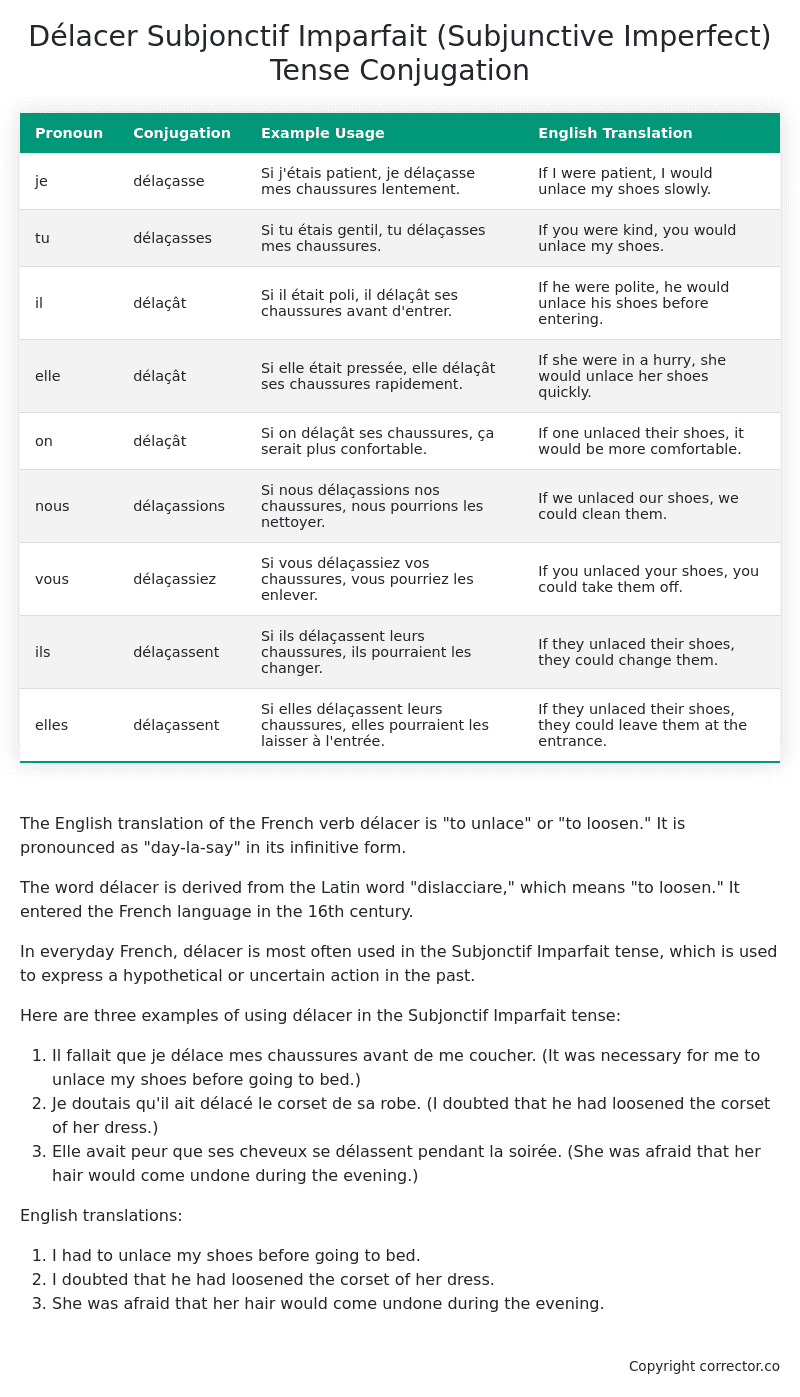Subjonctif Imparfait (Subjunctive Imperfect) Tense Conjugation of the French Verb délacer
Introduction to the verb délacer
The English translation of the French verb délacer is “to unlace” or “to loosen.” It is pronounced as “day-la-say” in its infinitive form.
The word délacer is derived from the Latin word “dislacciare,” which means “to loosen.” It entered the French language in the 16th century.
In everyday French, délacer is most often used in the Subjonctif Imparfait tense, which is used to express a hypothetical or uncertain action in the past.
Here are three examples of using délacer in the Subjonctif Imparfait tense:
- Il fallait que je délace mes chaussures avant de me coucher. (It was necessary for me to unlace my shoes before going to bed.)
- Je doutais qu’il ait délacé le corset de sa robe. (I doubted that he had loosened the corset of her dress.)
- Elle avait peur que ses cheveux se délassent pendant la soirée. (She was afraid that her hair would come undone during the evening.)
English translations:
- I had to unlace my shoes before going to bed.
- I doubted that he had loosened the corset of her dress.
- She was afraid that her hair would come undone during the evening.
Table of the Subjonctif Imparfait (Subjunctive Imperfect) Tense Conjugation of délacer
| Pronoun | Conjugation | Example Usage | English Translation |
|---|---|---|---|
| je | délaçasse | Si j’étais patient, je délaçasse mes chaussures lentement. | If I were patient, I would unlace my shoes slowly. |
| tu | délaçasses | Si tu étais gentil, tu délaçasses mes chaussures. | If you were kind, you would unlace my shoes. |
| il | délaçât | Si il était poli, il délaçât ses chaussures avant d’entrer. | If he were polite, he would unlace his shoes before entering. |
| elle | délaçât | Si elle était pressée, elle délaçât ses chaussures rapidement. | If she were in a hurry, she would unlace her shoes quickly. |
| on | délaçât | Si on délaçât ses chaussures, ça serait plus confortable. | If one unlaced their shoes, it would be more comfortable. |
| nous | délaçassions | Si nous délaçassions nos chaussures, nous pourrions les nettoyer. | If we unlaced our shoes, we could clean them. |
| vous | délaçassiez | Si vous délaçassiez vos chaussures, vous pourriez les enlever. | If you unlaced your shoes, you could take them off. |
| ils | délaçassent | Si ils délaçassent leurs chaussures, ils pourraient les changer. | If they unlaced their shoes, they could change them. |
| elles | délaçassent | Si elles délaçassent leurs chaussures, elles pourraient les laisser à l’entrée. | If they unlaced their shoes, they could leave them at the entrance. |
Other Conjugations for Délacer.
Le Present (Present Tense) Conjugation of the French Verb délacer
Imparfait (Imperfect) Tense Conjugation of the French Verb délacer
Passé Simple (Simple Past) Tense Conjugation of the French Verb délacer
Passé Composé (Present Perfect) Tense Conjugation of the French Verb délacer
Futur Simple (Simple Future) Tense Conjugation of the French Verb délacer
Futur Proche (Near Future) Tense Conjugation of the French Verb délacer
Plus-que-parfait (Pluperfect) Tense Conjugation of the French Verb délacer
Passé Antérieur (Past Anterior) Tense Conjugation of the French Verb délacer
Futur Antérieur (Future Anterior) Tense Conjugation of the French Verb délacer
Subjonctif Présent (Subjunctive Present) Tense Conjugation of the French Verb délacer
Subjonctif Passé (Subjunctive Past) Tense Conjugation of the French Verb délacer
Subjonctif Imparfait (Subjunctive Imperfect) Tense Conjugation of the French Verb délacer (this article)
Subjonctif Plus-que-parfait (Subjunctive Pluperfect) Tense Conjugation of the French Verb délacer
Conditionnel Présent (Conditional Present) Tense Conjugation of the French Verb délacer
Conditionnel Passé (Conditional Past) Tense Conjugation of the French Verb délacer
L’impératif Présent (Imperative Present) Tense Conjugation of the French Verb délacer
L’infinitif Présent (Infinitive Present) Tense Conjugation of the French Verb délacer
Struggling with French verbs or the language in general? Why not use our free French Grammar Checker – no registration required!
Get a FREE Download Study Sheet of this Conjugation 🔥
Simply right click the image below, click “save image” and get your free reference for the délacer Subjonctif Imparfait tense conjugation!

Délacer – About the French Subjonctif Imparfait (Subjunctive Imperfect) Tense
Formation
Common Everyday Usage Patterns
Interactions with Other Tenses
Subjonctif Présent
Indicatif Passé Composé
Conditional
Conditional Perfect
Summary
I hope you enjoyed this article on the verb délacer. Still in a learning mood? Check out another TOTALLY random French verb conjugation!


